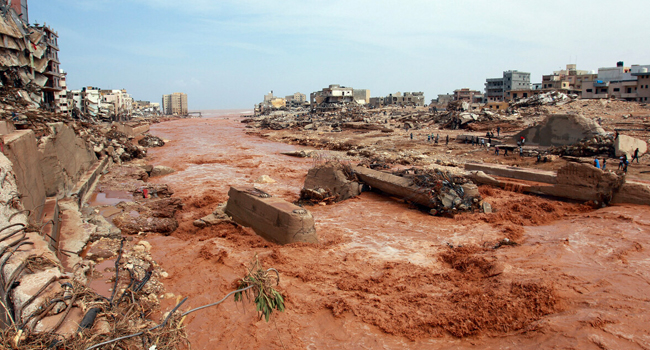Derna, 13th September 2023- The catastrophic Libya floods that struck the northeast, particularly the coastal city of Derna, has not only claimed thousands of lives and displaced tens of thousands but has also triggered a severe health crisis in the region. As emergency teams work tirelessly to find survivors and retrieve bodies, the health impact of the Libya flood is becoming increasingly evident.
Overwhelmed Healthcare Facilities
The flood, which occurred three days ago, has overwhelmed healthcare facilities in Derna, rendering hospitals inoperable due to extensive damage. Whole neighborhoods have been washed away, and with the collapse of crucial infrastructure, hospitals are struggling to provide even basic medical care.
Osama Aly, spokesperson for the Emergency and Ambulance Service in Libya, disclosed that morgues in the region are filled to capacity, and the grim sight of deceased individuals on sidewalks outside healthcare facilities paints a grim picture of the disaster’s toll on healthcare services.
Public Health Concerns Caused by the Libya Floods
Beyond the immediate challenges of treating injuries and illnesses resulting from the flooding, public health concerns are mounting. The stagnant floodwaters have created breeding grounds for diseases, including waterborne illnesses and mosquito-borne diseases like malaria and dengue fever.
Inadequate access to clean water and sanitation facilities exacerbates the risk of waterborne diseases, as displaced residents struggle to find safe drinking water and maintain proper hygiene practices. This situation has prompted health authorities to issue warnings and advice on disease prevention.
Mental Health Impact
The mental health toll on survivors and their families cannot be underestimated. As the death toll rises and many remain missing, residents are grappling with severe emotional trauma. Anxiety, depression, and post-traumatic stress disorder (PTSD) are expected to be prevalent among survivors and those who lost loved ones.
Relatives of the missing have expressed their terror, and those who have learned of their families’ tragic fate are left devastated, further underscoring the urgent need for psychological support services in the affected areas.
International Response and Aid
In response to the growing health crisis, international organizations, including the United Nations’ International Organization for Migration (IOM), are mobilizing resources and aid to assist with healthcare provisions, medical supplies, and psychological support services. However, reaching those in need remains challenging due to damaged infrastructure and logistics hurdles.
Efforts to restore healthcare facilities and ensure access to clean water and sanitation services are a top priority in the ongoing humanitarian response.
Long-Term Health Challenges
The aftermath of the flood is expected to bring about a series of long-term health challenges. Among them is the potential for a surge in communicable diseases, given the unsanitary conditions and overcrowded displacement camps. Malnutrition is also a concern as access to food becomes increasingly scarce.
Moreover, the destruction of healthcare infrastructure means that residents in the affected areas will continue to face difficulties accessing essential medical care, further exacerbating health disparities in the region.
Healthcare Workers Under Strain
Healthcare workers on the frontlines are under immense strain, working tirelessly to provide care despite limited resources and challenging conditions. Many are reporting exhaustion and burnout as they struggle to meet the overwhelming demand for medical attention.
Conclusion
As Libya’s northeast struggles to recover from the devastating flood, addressing the health impact of this disaster remains a critical concern. The coordination of international aid and the support of healthcare workers on the ground are essential in providing vital medical care and helping the affected communities rebuild their lives in the wake of this tragic event.
The road to recovery will be long and arduous, but with concerted efforts from both local and international organizations, there is hope that the health crisis can be gradually mitigated, allowing the people of Derna and surrounding areas to rebuild their lives and regain their health and well-being.



